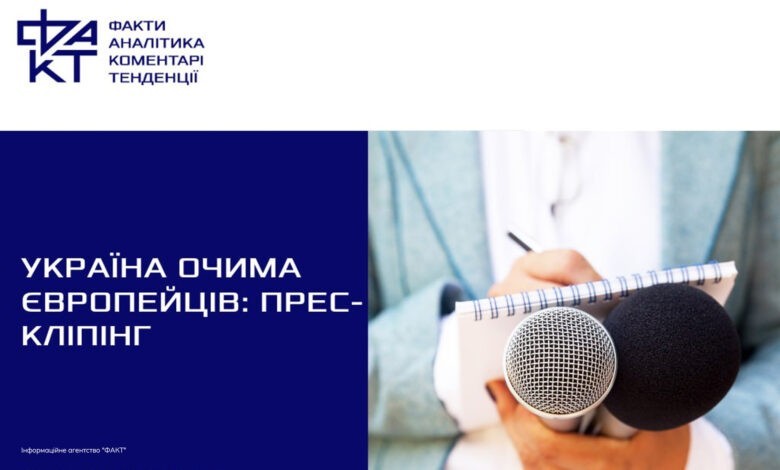Ukraine through the eyes of Europeans: press clipping

We continue to make press clippings of European media for you. We track the key topics through which Ukraine appears in the Western media space. How the Russian-Ukrainian war is seen by our partners, what horrors of the occupation worry them the most, what interests Europeans in Ukraine’s internal politics – read about all this in our material.
Edition The Guardian optimistically reports that Ukraine will start using F-16 aircraft already this summer.
At the same time, he cites the Minister of Defense of the Netherlands, K. Ollongren, who explains the delay in the transfer of the aircraft announced more than a year ago with a comprehensive approach to helping Ukraine. It is about the need to train pilots, and the training of technical workers, and the thorough training of service personnel.
F-16s are really much more complex than the systems that the Ukrainian Air Force has used so far, – The Guardian quotes the words of the head of the Ministry of Defense of the Netherlands. – Ukraine cannot just jump over a few steps, it has to fulfill every step of the process, at the same time we want to deliver the planes as soon as possible.
The British publication also quotes a Ukrainian aviation expert, military pilot Anatoly Khrapchynskyi, who assures: “the Russians will be forced to change their tactics, because we will be able to target their planes and missiles more effectively, and it will be very difficult for them to continue using the guided air bombs of KAB, which they should launch from a distance of 50 to 70 km”.
German edition The time publishes an article under the eerie title “Victims Whom No One Counts Anymore” with the subtitle “Remote Consequences of Wars”. The newspaper draws a parallel between the terrorist attacks of September 11, the Gaza Strip and the war in Ukraine, pointing to the long-term consequences of military actions. Even when wars end, those who survive amid the bombed-out ruins have more than just psychological trauma. Even the survivors, those who endured the war, will suffer from cancer, dementia and other diseases. The publication speculates that people living among dilapidated buildings are breathing in toxic particulates, similar to those who worked around the wreckage of the Twin Towers in the United States. These include, among other things, asbestos, crystalline silicon dioxide, which is part of concrete and can cause lung disease, cancer-causing dioxins, and polycyclic aromatic hydrocarbons. They occur as a result of incomplete combustion processes, for example, in industrial enterprises, but especially during fires, in the World Trade Center, in the Gaza Strip or in Ukraine due to bombing. Substances accumulate in the body, some of them decompose in the environment only after years.
The French publication Le Mond draws the attention of the European community to the current documentary report of the Human Rights Watch (HRW) organization, which talks about the “forced Russification of the school system in the occupied Ukrainian territories”. This document reveals the violations committed by the Russian authorities in the field of education, both in the former occupied territories of Kharkiv Oblast and in Kherson Oblast, Zaporizhzhia, Donetsk and Luhansk Oblasts, which are still under Russian occupation.
“You can do miracles with the Russian language” is the first sentence that a student wrote in his school notebook during a lesson on September 5, 2022 under Russian occupation in the village of Lisova Stinka, Kharkiv Region, Ukraine, photo LE MONDE.
According to the estimates of Ukrainian experts, 1 million school-age children currently live in Russian-controlled territories, including 458,000 in Crimea alone. According to the Ministry of Education, at the beginning of the 2023-2024 academic year, about 80,000 of them studied the Ukrainian program online, despite the risk of repression. However, online learning in the occupied zones remains very difficult, since after the occupation, the Russian authorities cut off all non-Russian telecommunication providers. “Russified” schools have very limited classes and teaching hours, insufficient staff and frequent lack of electricity.
The world tells the story of a boy from Melitopol who, due to drinking at school, the Ukrainian authorities expelled dozens of kilometers away with a bag on his head to an isolated area. The punished student had to go home alone. The occupiers also harassed and threatened parents with detention, heavy fines, and loss of custody of their children if they did not enroll them in “Russian” schools and did not leave to study the Ukrainian program online.
The Czech publication Denik N analyzed the latest surveys of Ukrainian sociologists regarding Zelenskyi’s presidency, mobilization, possible concessions and military victory over Russia and concluded that support for Zelenskyi is falling, but he should remain in office.
For example, a full half of the respondents believe that Volodymyr Zelensky has not fulfilled his pre-election promises. But at the same time, the main success is considered to be the repulse of Russian aggression.
After the end of the five-year term of office of the President of Ukraine, sociologists of KMIS were interested in public opinion, and found out, that for the general public, Zelenskyi should remain in office, as martial law continues.





